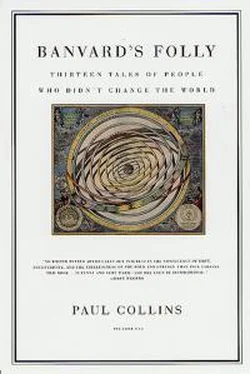Days and weeks passed without an invitation, and still he did not suspect.
His ridicule and fame increased with each month. At Home, a spoof of Coates's acting, was already running nightly at the Covent Garden Theatre, and this travesty of a travesty actually inspired a thoughtful defense of Coates and his work by a most unlikely ally, the magazine The European. An essay in its March 1813 issue featured an engraving that gives us one of the few portraits of Coates that is not a comic caricature. It followed with this spirited defense of his work:
However we may esteem MR. COATES for the liberality with which he has, upon many trying occasions, come forward to succour the distressed, we are not yet such dupes to our credulity as to believe that he would, or could, have braved the horrors of a series of theatric storm's, or smiled at the illiberal absurdities of a series of theatric imitation, had he not been strongly possessed with the histrionic passion; but as this, although, unprofessionally, perhaps, not a very laudable propension, is certainly, when
applied as he applies it, very innocent; therefore, when exercised in the cause of humanity, it ought rather to have been praised than censured. ...
We will venture to say, that Mr. Coates, as an actor, is infinitely more amusing than the generality of any of these critics. He is, in his way, quite as accomplished an artist; and infinitely more disinterested.
This hardly silenced audiences. They were now coming to the theater expecting, even demanding, to see Romeo and Juliet fall apart before their eyes. The motive was still so inchoate that nobody even had a word for it yet, but we certainly do today.
Robert Coates had, in utter innocence, invented Camp.
Those around Coates did not bear the brunt of this new artistic experience with such panache. At the April 23 benefit performance, the beneficiary, Miss FitzHenry, had agreed to take on the part of Juliet; after the marriage scene she was almost reduced to tears by the crowd's booing and hissing, and she fearfully threw her arms around a stage pillar.
A few weeks later, during the May 10 performance, one wag in the audience smuggled in a rooster under his coat; just as the duel between Romeo and Tybalt was about to begin, the clucking and flapping fowl was tossed up on the stage, where he strutted around the scenery amid shouts of Cock-a-doodle-doo!
Coates at long last lost his patience--he turned to the patrons of one offending box and shook his sword at them, a clear provocation to a duel. They bawled out angry demands for an apology, which he would not give. Orange peels proceeded to rain down upon him and the other actors. Then the hecklers dispensed with the courtesy of peeling altogether; after the death scene of Paris, one patron whipped an entire orange across the theater and belted the slain Paris on the nose, whereupon the "dead" man stood up, angrily pointed at the offending fruit, and stormed offstage. When Romeo's turn to die onstage came, his famous histrionics kept getting preempted by yelling from the boxes:
"Why don't you die?"
Such words simply rolled off Coates. But later that year, his sincerity was thrown into question. This was the one thing he could not bear to hear, and it hurt him so badly that he never entirely recovered. An army widow had beseeched Coates for help, and so he helpfully planned out a benefit show for her on December 1. He was to play the role of Belcour in the play The West Indian. After the last few shows, Coates had wisely inserted this statement into the evening's playbill:
A Reward of l5 will be paid by the gentleman who plays "Belcour" on conviction of each offender throwing anything on the stage to annoy the performers.
But as the show began that night, a young man stood up in the audience and demanded to be heard. There was a serious accusation to be lodged against Robert Coates, he said gravely: "Ladies and gentlemen, the charge against Mr.
Coates is that he does not act upon a principle of philanthropy, but directly or indirectly gives his services for remuneration."
The crowd erupted in a tumult, with shouts for proof. The young man described how the young woman benefiting from that night's show had fallen into dire straits. "Having heard of Mr. Coates's generosity in these matters," he continued, "she applied to him, through the medium of Mrs. Lyall, that gentleman's landlady. ... Aid was persistently refused, until the benficiary agreed to give Mrs. Lyall forty pounds for the amateur's services."
He then produced a copy of the receipt. The crowd was outraged and broke into an uproar. Coates, for once in his life, was struck dumb with horror at their jeers.
It is hard to know what might have appalled Coates more--the idea that he was acting from less than sincere motives, or the imputation that a man of his enormous wealth would be extorting such trifling amounts from people. But after the show he threw himself and his money into an investigation of the matter, and found to his disgust that it was all true. His landlady at his Craven Street lodgings, Mrs. Lyall, was collecting payment from the straitened widows and orphans that he had been performing for, all the while claiming that she was doing it under Coates's orders. Coates marched Mrs. Lyall over to the offices of the mayor of London and had her issue a full written confession, witnessed and notarized by the mayor himself. He had the confession set into type, and then printed and distributed widely, but it was too late; the damage had already been done to his reputation among Londoners.
Yet theater managers and needy widows in other cities were still beseeching him for help, and so in 1814 he began playing outer cities like Birmingham--these crowds were delightfully unironic, simply enjoying the spectacle of Coates repeating the death throes of Lothario and Romeo. But his high point was in Stratford-on-Avon that December, playing his beloved Shakespeare in the Bard's own hometown. One patron of the barnlike Stratford theater, Charles Matthews, watched on in bemusement: That darling Fancy's child of Nature-Coates--acted here, and was advertised in the character of Romeo.
After he had acted, he was determined to have a procession all by himself, a minor pageant ... and walked, dressed as Romeo, from the barn to the butcher's shop where Shakespeare was born. Here he wrote his name on the walls and in the book kept for that purpose, called himself the illustrator of the poet, complained of the house, said it was not half good enough for the divine bard to have been born in, and proposed to pull it down at his own expense and build it up again, so as to appear more worthy of such a being!
But few of Coates's grand plans came to pass anymore; his plantations on Antigua suffered reversals, and he slowly found himself with less and less income to flaunt. Over the next couple of years his star faded from the British stage; his fans moved away from him and on to the next bright and shining object. Coates, still devoted to his Bard, was left alone again.
Without his public, and entering his fifties, Coates sought companionship. He found it in Miss Emma Robinson, and married her in 1823. The two became devoted helpmates and produced a son and a daughter. But Coates, who alone had escaped childhood death from among his many siblings, was not so lucky with his own children-neither lived to see adulthood.
Humbled by his shrinking fortune and domesticated by marriage, Coates decamped from London to Boulogne-sur-Mer, where tapped-out English nobility and misspent capitalists retired to ponder their financial exile. Sometimes, when a visitor recalled the old days in London, the Amateur of Fashion could be coaxed into giving one of his famous recitations. But no matter how many times he was asked, he refused to take to the stage again.
Читать дальше











